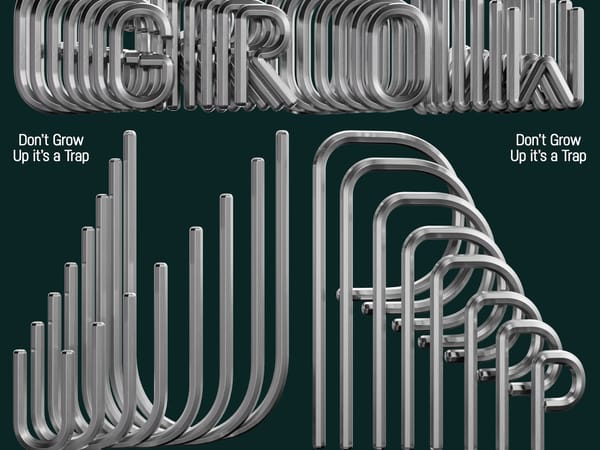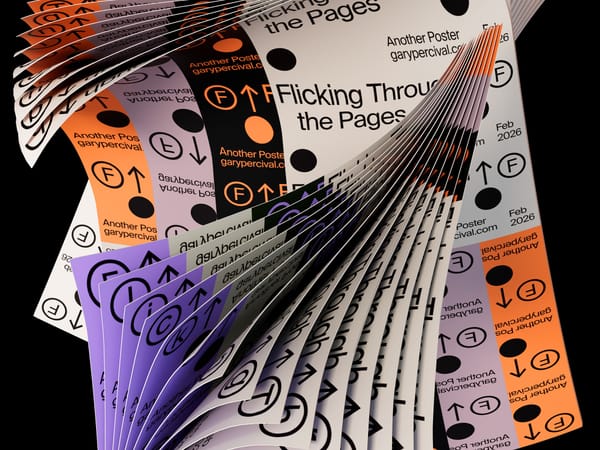Why Your Ability to Influence Outcomes Matters in Freelancing
Influence isn't just about convincing people. It's about creating an atmosphere where your ideas are heard, respected, and ultimately acted upon.


We often get caught up in mastering our design skills—be it in typography, web design, or creating that perfect book cover—that we sometimes overlook another crucial element of freelancing: the power to influence outcomes.
Sounds a bit abstract, right? But trust me, this is as concrete as it gets when we talk about climbing the ladder of freelance success.
"Influence isn't just about convincing people. It's about creating an atmosphere where your ideas are heard, respected, and ultimately acted upon."
This skill transcends the scope of any design tool or software and dives into the softer yet complex realm of persuasive communication, relationship building, and demonstrating your expertise.
All of these make you not just a freelancer but a valuable partner for your clients.
Let's dive into how these three key elements can substantially improve your freelance business as well as the quality of your work and life.
Use Persuasive Communication
Making Your Voice Heard
Alright, let's dive right in. The first element we're focusing on is persuasive communication.
"It's not just about what you say; it's also about how you say it."
This can literally be the difference between a client saying, "I'll think about it," and "Where do I sign?"
Tailor Messaging and Tone for Each Client
Not all clients are created equal. What works for a start-up might not fly with a corporate client. When talking to potential or existing clients, it's important to match their language and tone.
If you've got a client that loves formal emails and comprehensive breakdowns, give it to them. On the flip side, if they prefer a laid-back approach, a casual email with just the essentials could be far more effective.
"Matching tone to the client is key for engagement and resonance."
The idea is to make them comfortable while communicating in a way that resonates with them.
Make Logical and Emotional Appeals
Anyone can spit out facts and figures. It takes skill to present them in a way that appeals to both the logical and emotional sides of your client.
A logical appeal could be highlighting the return on investment (ROI) your design services offer, while an emotional appeal might focus on how your design will resonate with their audience's deepest desires.
"Balancing both logical and emotional appeals will give your pitch a well-rounded, persuasive edge."
Use Storytelling and Visuals to Make Your Ideas Stick
Show, Don’t Just Tell
We all remember stories far better than isolated facts or statements. Incorporate storytelling into your pitches or when explaining your design choices.
You can talk about a client you helped in a similar situation and how your design intervention turned things around for them.
"Stories make ideas relatable while visuals make them memorable."
Visuals can simplify complex information, evoke emotions, and, most importantly, make your idea a lot more memorable.
So, whether it's a slick presentation or mock-ups that show your designs in real-world applications, make them as compelling as the story you're trying to tell.
Build Strong Relationships
Your Network is Your Net Worth
Moving on, let's talk about something that's as essential in freelancing as it is in life: relationships. Yeah, it might sound like we're veering into dating advice territory, but hear me out.
"Building strong relationships with your clients doesn't just help you retain business; it also makes you a more influential freelancer."
Take Time to Understand Clients' Needs and Motivations
Before you can influence anyone, you have to know what makes them tick. That means really listening during meetings, asking insightful questions, and doing your homework.
Take the time to understand not just the project specs but also what drives your client. Is it increasing their revenue? Is it enhancing their brand's reputation?
Once you know this, you can tailor your services and communication to align with their objectives.
"Knowing what motivates clients allows you to provide targeted solutions."
Earn Trust by Being Reliable and Delivering Great Work
Trust is like currency in the freelance world—you can't do much without it. To earn your client's trust, you need to be reliable.
That means meeting deadlines, staying within budget, and exceeding expectations whenever possible. But being reliable isn't just about your work. It's also about being consistent in your communication, following through on promises, and even admitting when you've messed up and rectifying it.
"In the long run, reliability translates to influence."
When you're trusted, your opinions and suggestions carry more weight.
Cultivate a Network of Connections You Can Call On
Don't underestimate the power of a strong network. You never know when you might need to call in a favour, ask for advice, or collaborate on a project.
Networking doesn't have to be a sterile, transactional ordeal, either. A simple coffee catch-up or even a quick chat over social media can be enough to keep the relationship warm.
Plus, a robust network can also serve as a referral system. The more people in your industry who know and trust you, the more influential you become.
Adapt to Change
Stay Ahead of the Curve
So, we've talked a lot about developing key skills and fostering relationships to build influence, but let's not forget that the freelance landscape is ever-changing. New design tools, shifting client expectations, and even global events can throw a wrench in your best-laid plans.
"How you adapt to change can significantly impact your ability to influence outcomes."
Let's unpack this a bit.
Anticipate and Prepare for Shifting Circumstances
You know the saying, "Failing to prepare is preparing to fail." If you're attuned to the needs of your clients and the trends in your industry, you'll have a much better chance of anticipating changes.
Stay up-to-date with the latest tools, design techniques, and industry news. Be proactive rather than reactive. By doing so, you can offer solutions to problems your clients may not even be aware of yet.
This foresight is a powerful tool for influence. Your clients will come to see you as not just a freelancer but as a valuable advisor.
"Foresight positions you as an advisor clients can rely on."
Pivot Strategically When Needed
Despite thorough planning and foresight, there are times when you may need to make a snap decision. Perhaps the scope of a project shifts unexpectedly, or a sudden industry trend renders your current work less relevant.
The ability to pivot—strategically and effectively—can be a lifesaver. For instance, if you notice that your clients are increasingly asking for video content over traditional graphic designs, reallocating your resources to learn video editing skills could be a strategic move.
Strategic pivots like these demonstrate to clients that you're not just adaptable but also savvy about the broader landscape.
Remain Flexible and Open-Minded
Having a plan is great, but rigidity can sometimes be your downfall. New ideas can come from anywhere—even your clients.
The willingness to listen, adapt, and even change your point of view is invaluable. This flexibility shouldn't be mistaken for a lack of conviction; instead, it's a sign of an open mind.
Being flexible allows you to accommodate last-minute changes or feedback more easily, and this adaptability makes you a more appealing choice for clients who value a collaborative approach.
What's Next? Developing Your Influence Toolkit
Practical Steps to Up Your Game
So, you've got the rundown on why influence is essential in freelancing. But you might be asking yourself, "What practical steps can I take to actually become more influential?" Great question! Let's explore some actionable tips to elevate your influence game.
Continual Learning and Skill Upgradation
In the freelancing world, standing still is akin to moving backwards. To be influential, you have to be on top of your game. That means investing in yourself—updating your skills, learning new design software, or even branching out into related areas like motion graphics or UX design.
The more versatile you are, the more solutions you can offer, making you an indispensable asset to your clients.
Take the Initiative
Don't wait for clients to come to you with problems. If you spot something that could be improved or a potential challenge down the line, bring it up proactively.
Clients appreciate it when you’re looking out for their best interests, and it also positions you as a problem-solver, increasing your sphere of influence.
Know Your Worth and Communicate It
Here's where many freelancers fall short: You might be great at what you do, but if you can't articulate your value, you're at a disadvantage.
This is where your portfolio, case studies, and testimonials come in. Make sure you have a well-curated, easily accessible showcase of your work, along with client feedback that can vouch for your skills and reliability.
"Your past success stories are your best sales pitch."
Leverage Social Proof
In today’s digital world, a strong online presence can be a game-changer. Use platforms like LinkedIn or Instagram to share your achievements, industry insights, and even client testimonials.
Engage with your audience by sharing helpful tips, tricks, and how-tos. Not only does this increase your reach, but it also builds your reputation as an industry expert, enhancing your influence.
Seek Feedback and Iterate
Nobody's perfect. You'll make mistakes, and that's okay. What sets influential freelancers apart is how they handle these situations. Always ask for feedback, and more importantly, act on it.
Showing that you're willing to learn and adapt will earn you respect and make your services even more valuable in the eyes of your clients.
Conclusion
So, there you have it—a practical guide to upping your influence game as a freelancer. In an ever-competitive market, your ability to influence can be your secret weapon, making the difference between simply getting by and truly thriving.
And remember, influence is less about control and more about building meaningful relationships that lead to mutual success.
Even More Key Takeaways
- Continual Learning: Stay ahead by continually upgrading your skills and knowledge.
- Take Initiative: Don't wait for issues to arise; be proactive in problem-solving.
- Know and Communicate Your Worth: Your portfolio and past successes are your strongest advocates.
- Leverage Social Proof: Utilise social media to build your reputation and influence.
- Seek and Act on Feedback: Use constructive criticism to improve and adapt.
Don’t just be a freelancer. Be an influential freelancer. So, what are you waiting for? Time to get out there and make some waves!
Love What You've Just Read? Make Some Waves! 🌊
If this guide has helped you, imagine how it could benefit your fellow freelancers out there! Hit that share button and spread the knowledge. Let's help each other climb the ladder of freelance success—one share at a time.
👇 Click Below to Share! 👇



